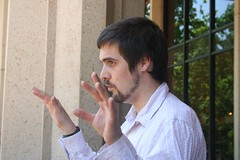as for my previous concern as to whether the author of Reluctant Disciplinarian, Gary Rubenstein, ever "redeems himself from a stance of oblique, humor-begging iconoclasm": he does not, or only barely does.
while this is a book of overly-honest (soul bearing on the verge of histrionics) reflection, and while it is a book ostensibly of step, misstep, and re-step - three necessary experiences of the young teacher-who-may-yet-survive (another unwelcome stuffing of the phrase "lifelong learner," i fear) - reluctant disciplinarian, in the end, fails to provide any real substance through the vehicle of its zany, fresh approach. however, it does produce - from time to time - the exact opposite of substance: an uncomfortable vacuum of reduction and near-fatalism. that is, its street-smart, inside-scoop, tell-it-like-it-is journalistic posing hides some rather disturbing monsters. i'll run through a few favorites (and - these are not the views and/or actions that the author had advocated during his failed first year; these are his "how things work" positons):
"still, i kind of liked the novelty of being poor. clipping coupons and eating pasta most nights was fun, like a game." (117)
a game? are you kidding?
"I knew that 'cool' didn't work for me. Nor could I be my nerdy self for fear that these high school students would make fun of me, just as high school students had when I was a student. I was concerned because I didn't know what identity to assume." (103)
so... he's got "identity" issues. he just needs to find his "real" self...
"I nerdier I became, the more my students responded. I would even go home and practice intellectual feat to enhance my image. While teaching ninth grade class about circles, I mentioned pi. 'Most people think that pi is equal to 3.14,' I said, 'but really it goes on. It starts out 3.141592653589793238462,' I continued on for the first 100 digits." (104)
... and his real self is a bag of faux-esoteric math parlor tricks meant to impress high school students. something doesn't add up here (excuse the pun): he compensates for his lack of personal confidence by wowing kids with the detritus from his glory days as a math competition champ in junior high (102). i'm not clear how (a) this has anything to do with the author "being real," or (b) how this assists his children in learning - if in no other way than putting/persisting a thin veil of impenetrability/unapproachability over math concepts. his concepts of "teacher personas," and the "real teacher" follow a similar line: thin masquerades worried more about believability than function (he does, however, equate believability with fuction (81); agreeably, illusion is a huge part of the equation, but rubenstein seems to give it undue sole primacy - especially where he advises that a teacher to deferr to the student's expectations when presenting material; in this case, i could essentially lie to a student, or even perpetuate his/her own previous lies, but still suceed in producing a belief in the student that he/she has learned. note to prof parker: it seems i've abandoned my championing of arbitrariness here; this sort of lie seems somehow worth a fuss; a part of me wants to champion the space between real/un-real, but a part of me sees an undue cognitive disservice; perhaps, it's the aim of the lie - or if the lie has an aim; prof, i'm puzzled: where is teaching not lying? because i think some of it isn't, or at least intends to not be. however, some of it is, and has to be. it is, of course, structured like a language).
perhaps my failure to connect with this book is because he's trying to demystify illusions that i don't particularly feel like i harbor, (of course, a been-there-done-that mentality in the book that seems to bet on me crawling back to this book in the fall, begging for mercy, ready with an "i told you so") nor that i value. rubinstein seems to go from overconfident and clueless, to overconfident and somewhat experienced. to his credit, he admit his mistakes, but he seems to do this only after rushing jovially into a thicket.
the twit
6.28.2005
Subscribe to:
Post Comments (Atom)

2 comments:
The problem with the notion of lie: the intentional deception. What if teaching were, instead, more like . . . fiction?
then of course there are lies that become the truth...
(and billie jean is not my lover)
Post a Comment